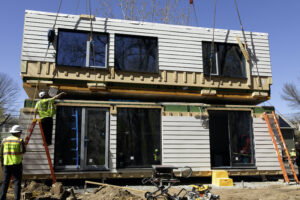Who is a member?
Our members are the local governments of Massachusetts and their elected and appointed leadership.

Workers assemble two prefabricated boxes to create a modular accessory dwelling unit in Arlington. (Photo courtesy Frank Tadley/Housing Corporation of Arlington)
As Massachusetts cities and towns confront an ongoing housing crisis, a partnership between the town of Arlington and a local nonprofit has resulted in the installation of an all-electric, modular accessory dwelling unit that leaders hope will inspire similar innovations elsewhere in the region.
Through its Affordable Housing Trust, the town used $260,000 in American Rescue Plan Act funds to the nonprofit Housing Corporation of Arlington to help fund the ADU, which was installed behind a two-family home owned by the nonprofit. The town, which already had a close working relationship with HCA, saw the project as another opportunity to support the nonprofit’s work, widen the housing options available to residents, and demonstrate its commitment to sustainable building solutions, said Town Manager Jim Feeney.
“It checked a number of boxes that exist within the town’s published plans,” Feeney said. “It certainly touched upon the sustainability goals that we have, given that it’s all-electric, [and] obviously, we have a need for more housing, especially more affordable housing.”
In 2021, Arlington Town Meeting voted to allow ADUs by right, the same year the state’s new Housing Choice provisions made it easier for communities to enact certain zoning changes (including ADU zoning) by reducing the approval threshold from two-thirds to a simple majority vote. In Arlington, units cannot exceed 900 square feet, and ADU applicants typically must sign an affidavit promising that either the owner, or a relative, will live in either the ADU or the main house.
So far, Arlington has seen about a dozen new ADUs since the bylaw went into effect, Feeney said, and is getting an increasing number of inquiries.
The Housing Corporation of Arlington’s ADU is the first modular unit installed by Reframe Systems, an Andover-based startup. The project is also the first ADU for the nonprofit, which typically focuses on larger affordable housing projects, said HCA Executive Director Erica Schwarz. Given Reframe’s modular design innovations, and the chance to create a demonstration project, the nonprofit embraced a new approach to addressing the area’s affordable housing shortage, Schwarz said.
“From our perspective, the crisis is so great, and just worsening so much,” Schwarz said. “I mean, I started working in affordable housing over 20 years ago, and it’s like, ‘Oh my God, how could the crisis get any worse?’ There are no words for how horrible it is.”
Modular installation costs significantly less than traditional construction, and the town’s ARPA contribution will fund a majority of the estimated $325,000 cost for the ADU, Schwarz said.
Reframe installed the modular home in late April, replacing an unused garage. The two-story, 900-square-foot ADU has two bedrooms, a kitchen, a living area, one-and-a-half baths, storage space, and large windows overlooking a wooded area, Schwarz said. According to Reframe’s website, its ADU units feature all-electric heat pumps, rooftop solar panels with battery storage, and environmentally friendly building materials and design features.
The HCA hopes to get the certificate of occupancy by the end of June, and is planning to rent the unit for $1,670 a month. The nonprofit will hold an affordable housing lottery to select the new tenant, from qualified applicants making no more than 60% of the area median income, Schwarz said.
Given the potential complexities and newness of ADUs for many communities, Feeney said, municipalities should help to demystify the process for stakeholders. On June 12, Arlington plans to hold an information session to answer frequently asked questions and address the benefits of ADUs, he said.
“It provides a good housing option, but I think it can only be one of the tools in our toolbox, because it’s not going to provide as many units as are needed,” Feeney said. “But it is a very good step in the right direction.”